
Opir Materialiv i Teoria Sporud-Strength of Materials and Theory of Structures
Scope & Guideline
Exploring the Strengths of Materials for Safer Structures
Introduction
Aims and Scopes
- Structural Analysis and Design:
The journal emphasizes the analysis and design of various structures, including buildings, bridges, and other civil engineering projects, using both traditional and advanced methodologies. - Material Behavior and Properties:
Research on the mechanical properties and behavior of different materials, particularly in relation to their application in construction and structural integrity, is a core focus. - Numerical and Experimental Methods:
The use of numerical simulations, finite element analysis, and experimental modeling to predict and evaluate the performance of materials and structures under various loading conditions is prevalent. - Dynamic Response and Stability:
The journal explores the dynamic behavior of structures and their stability under different environmental and operational conditions, including vibrations and seismic effects. - Innovative Construction Techniques:
There is a focus on new construction techniques and materials, including the use of polymers, composites, and advanced reinforcement methods to enhance structural performance. - Optimization Techniques:
Research related to optimization in structural engineering design, including parametric optimization and efficiency improvements in load-bearing systems.
Trending and Emerging
- Sustainability and Energy Efficiency:
There is a notable increase in research focused on sustainable materials and energy-efficient design practices within structural engineering, addressing global environmental challenges. - Smart Materials and Structures:
Emerging interest in smart materials that respond to environmental stimuli, enhancing structural performance and adaptability, is becoming more prevalent. - Computational Modeling and Simulation:
Advancements in computational tools and techniques, including machine learning and AI applications for predictive modeling in structural engineering, are gaining traction. - Impact and Damage Assessment:
Research on the impact of external forces, including blasts and natural disasters on structures, is increasingly important, reflecting real-world concerns in urban planning and safety. - Resilience and Robustness in Design:
The exploration of resilience and the ability of structures to withstand extreme events without catastrophic failure is an emerging theme that addresses current challenges in civil engineering.
Declining or Waning
- Traditional Materials Research:
The exploration of conventional materials, such as basic concrete and steel, has decreased as researchers shift towards more innovative and composite materials. - Static Load Analysis:
Studies focusing solely on static load analysis are less prominent, with a growing trend towards dynamic analysis and real-world loading conditions. - Basic Structural Mechanics:
Fundamental studies of structural mechanics, while still relevant, are increasingly overshadowed by advanced computational methods and multi-disciplinary approaches that integrate various engineering fields.
Similar Journals
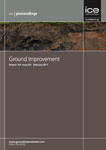
Proceedings of the Institution of Civil Engineers-Ground Improvement
Innovating Civil Engineering Through Groundbreaking ResearchProceedings of the Institution of Civil Engineers-Ground Improvement is a distinguished journal published by EMERALD GROUP PUBLISHING LTD, dedicated to advancing knowledge and research in the fields of Building and Construction, Geotechnical Engineering, Mechanics of Materials, and Soil Science. With an ISSN of 1755-0750 and an E-ISSN of 1755-0769, this journal has been a vital platform for disseminating innovative research since its inception in 2008. With an impact factor placing it in the Q3 category across multiple engineering disciplines, it ranks favorably in Scopus, ensuring visibility and recognition among scholars globally. The journal offers open access options, allowing for broader dissemination of research findings. Targeting researchers, professionals, and students alike, it aims to foster discussions on ground improvement technologies and methodologies that are essential for sustainable infrastructure development. As it continues to converge its focus until 2024, the Proceedings stands as an imperative resource for those seeking to elevate their understanding and contribute to the ever-evolving field of civil engineering.
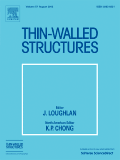
THIN-WALLED STRUCTURES
Innovating Design for Safer, Efficient StructuresTHIN-WALLED STRUCTURES is a premier international journal published by Elsevier Science Ltd, focusing on the critical areas of Building and Construction, Civil and Structural Engineering, and Mechanical Engineering. With an impressive impact factor and categorization in the Q1 quartile of each respective field, this journal stands at the forefront of engineering research, boasting commendable Scopus rankings—52nd for Mechanical Engineering, 18th for Building and Construction, and 32nd for Civil and Structural Engineering. Since its inception in 1983, THIN-WALLED STRUCTURES has provided a vital platform for disseminating innovative research, practical applications, and theoretical advancements in thin-walled structures, encouraging the development of safer and more efficient design methodologies. Although it operates on a traditional access model, the journal is committed to maintaining high-quality peer review and publishing, making it an essential resource for researchers, professionals, and students aiming to contribute to and benefit from the latest advancements in this dynamic field.
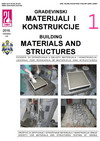
Gradevnski Materijiali I Konstrukcije-Building Materials and Structures
Advancing construction knowledge for a sustainable future.Gradevnski Materijiali I Konstrukcije - Building Materials and Structures is a premier open-access journal dedicated to advancing the field of construction materials and structural engineering. Published by SOC MATERIALS & STRUCTURES TESTING SERBIA, this journal provides a platform for researchers, professionals, and students to share their innovative findings and developments in building materials. With a commitment to open-access since 2012, it fosters unrestricted availability of research for a wider audience, encouraging collaboration and knowledge dissemination. The journal features a diverse range of topics, including material testing, structural integrity, and sustainable construction practices, making it a vital resource for those engaged in the design and analysis of structural components. By fostering the advancement of research and practice in this crucial sector, Gradevnski Materijiali I Konstrukcije plays an essential role in shaping the future of construction and material science.

International Journal of Steel Structures
Elevating Standards in Steel ConstructionWelcome to the International Journal of Steel Structures, a distinguished publication dedicated to advancing the field of civil and structural engineering since its inception in 2010. Published by the Korean Society of Steel Construction (KSSC), this journal aims to provide a platform for researchers and professionals to share innovative findings and essential insights related to steel structures, emphasizing both theoretical and applied research. With an impact factor that reflects its growing recognition—ranking in Q3 within the civil and structural engineering category—the journal has positioned itself as a significant contributor to the body of knowledge in this vital field. Although currently not an open-access publication, it remains an invaluable resource for students and scholars keen on exploring contemporary challenges and advancements in steel construction. Located in Seoul, South Korea, the journal continues to evolve, converging its presence into the future, with publication efforts spanning through to 2024. Engage with us as we explore the innovative applications and developments in the realm of steel structures.
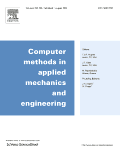
COMPUTER METHODS IN APPLIED MECHANICS AND ENGINEERING
Transforming Theoretical Insights into Practical Applications.COMPUTER METHODS IN APPLIED MECHANICS AND ENGINEERING, published by Elsevier Science SA, is a premier journal that has significantly contributed to the fields of computational mechanics, computer science applications, mechanical engineering, and the mechanics of materials since its inception in 1972. With an ISSN of 0045-7825 and an E-ISSN of 1879-2138, this journal is recognized for its rigorous peer-review process and is consistently ranked in the Q1 quartile across multiple categories, including Computational Mechanics and Mechanical Engineering. Its impressive Scopus rankings place it in the top tiers of its field, with a percentile ranking of 98th in Computational Mechanics. Researchers, professionals, and students will find the journal's comprehensive scope and high-quality articles invaluable for advancing their knowledge and practices at the intersection of engineering and computation. Although not an open-access journal, its impactful contributions to both theoretical and applied research make it an essential resource for anyone involved in these dynamic fields.
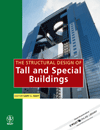
STRUCTURAL DESIGN OF TALL AND SPECIAL BUILDINGS
Pioneering Research in Tall and Special Buildings.STRUCTURAL DESIGN OF TALL AND SPECIAL BUILDINGS is a prestigious journal published by Wiley that focuses on cutting-edge research and advancements in the field of structural engineering, particularly emphasizing tall and special structures. Since its inception in 2003, the journal has become an invaluable resource for academics and practitioners, showcasing innovative design methodologies, case studies, and theoretical contributions. With an ISSN of 1541-7794 and E-ISSN of 1541-7808, this esteemed publication holds impressive Scopus rankings, including Q1 in Architecture, making it a go-to source for the latest developments in engineering related to tall buildings and complex structures. The journal is known not only for its rigorous peer-reviewed articles but also for fostering a collaborative environment among professionals and researchers worldwide. Although it is not an open-access journal, readers from various disciplines, such as architecture, civil and structural engineering, and building construction, will find compelling insights that drive the industry forward. For those committed to excellence in structural design, STRUCTURAL DESIGN OF TALL AND SPECIAL BUILDINGS remains at the forefront of innovation and knowledge dissemination.

Rock and Soil Mechanics
Connecting Global Scholars in Civil and Structural EngineeringRock and Soil Mechanics is a premier academic journal published by SCIENCE PRESS focusing on the critical fields of civil and structural engineering, geotechnical engineering, and soil science. With an ISSN of 1000-7598 and transitioning to an Open Access format since 2020, the journal strives to enhance the accessibility of cutting-edge research to a global audience, making significant contributions to practices and methodologies in these crucial disciplines. Ranked in the Q2 category for Civil and Structural Engineering as well as Geotechnical Engineering and Engineering Geology, and Soil Science, it boasts respectable standings in Scopus rankings, further affirming its relevance and credibility within the scientific community. The journal not only serves as a platform for original research but also engages with the latest advances in technology and innovative applications in rock and soil mechanics, proving invaluable for researchers, practitioners, and students alike as they navigate an increasingly complex field of study.

ACI STRUCTURAL JOURNAL
Advancing Concrete Innovation for Tomorrow's StructuresThe ACI Structural Journal, published by the American Concrete Institute, serves as a premier platform for scholarly articles and research findings in the fields of building and construction and civil and structural engineering. With a commitment to advancing concrete technology and its applications, this journal has amassed an impressive reputation, holding a Q2 ranking in both Building and Construction and Civil and Structural Engineering categories as of 2023. The journal’s focus on innovative research and practical applications enables professionals, researchers, and students to stay at the forefront of industry developments. Although it does not offer open access, the content bears significant impact, ensuring that readers engage with high-quality research. As the journal converges its years of publication from 1987 to 2024, it continues to enrich the academic and professional discussions surrounding structural engineering and concrete science.

Electronic Journal of Structural Engineering
Exploring Open Access Solutions in Structural EngineeringThe Electronic Journal of Structural Engineering (ISSN: 1443-9255), published by EJSE INT LTD, serves as a vital platform for disseminating innovative research and developments in the field of structural engineering. Since its inception in 2001, the journal has evolved to embrace an Open Access model starting in 2022, ensuring that cutting-edge findings are freely accessible to researchers, professionals, and students worldwide. Housed within the reputable Department of Infrastructure Engineering at the University of Melbourne, Australia, the journal focuses on a wide range of topics related to civil and structural engineering, positioning itself within the Q4 category on the 2023 Scopus rankings. While its H-index and detailed scope data are currently unavailable, the journal's commitment to quality research is evident through its continuous publication and engagement with the global academic community. With significant implications for contemporary engineering practices, The Electronic Journal of Structural Engineering not only fosters scholarly discourse but also encourages practical applications of structural engineering advancements.
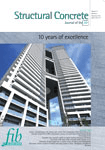
Structural Concrete
Transforming Construction Practices Through ResearchStructural Concrete, published by ERNST & SOHN, is a premier journal dedicated to the field of Civil and Structural Engineering, focusing on innovative research and advancements in concrete materials and technologies. With an impressive impact factor and a consistent ranking in the Q1 category of both Building and Construction and Civil and Structural Engineering, the journal stands as a vital resource for researchers, professionals, and students alike. It is indexed with notable Scopus ranks, underscoring its significance within the academic community. The journal spans a comprehensive scope (from 2001 to the present) that encompasses diverse topics related to the behavior, design, and application of structural concrete. Although not an open access publication, it offers valuable insights and cutting-edge knowledge that contribute to the ongoing evolution of construction practices and materials science. Structural Concrete is an essential platform for sharing pioneering findings and fostering collaboration within this dynamic field.